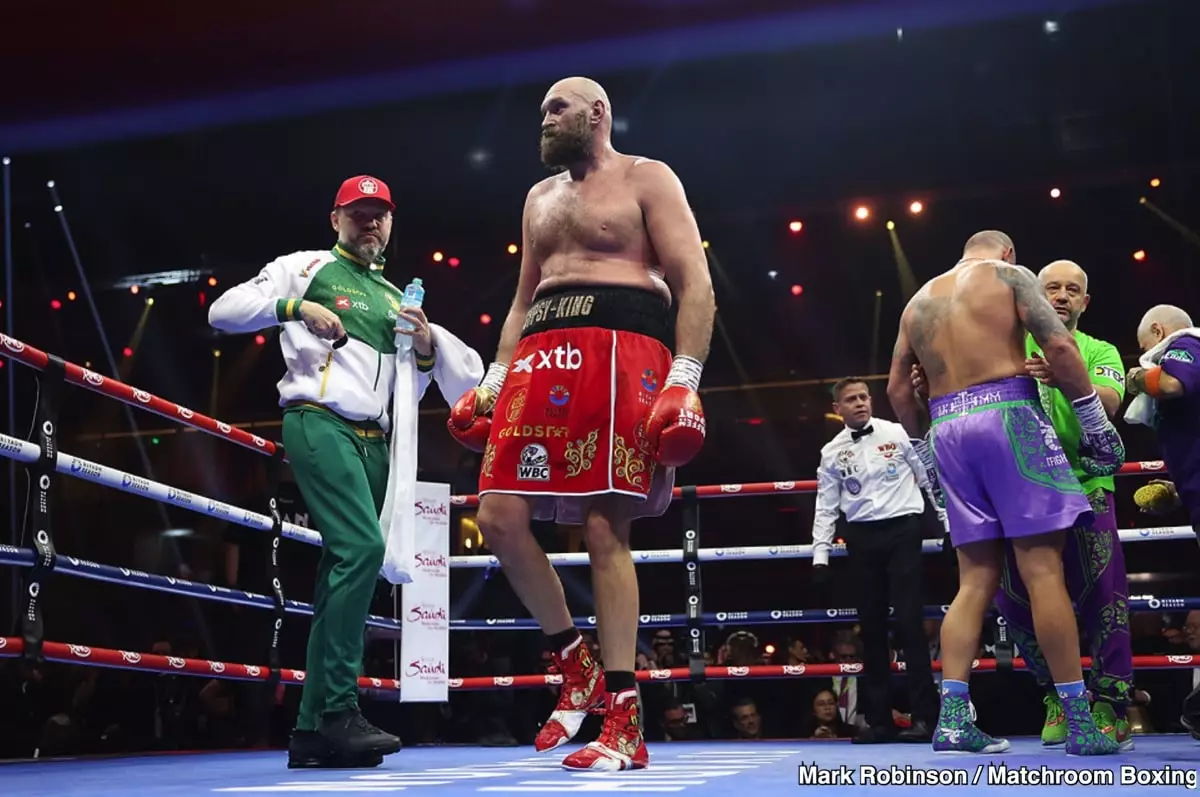Tyson Fury, a name that has echoed through the corridors of boxing history, is once again at the center of a retirement announcement. On the surface, it appears to be a straightforward declaration; however, for those who have followed his career closely, this statement is steeped in layers of irony and skepticism. The boxing world is no stranger to Fury’s proclamations of retiring, making it difficult to gauge the sincerity of his latest words. With an eccentric personality and a career marked with both brilliance and controversy, the question remains: Is this truly the end of Tyson Fury, or is it merely another chapter in his storied saga?
Fury’s retirement announcement was delivered in his signature flamboyant style, featuring quirky remarks and a hint of drama. But, before we dive into the implications of this announcement, it is essential to recall the frequency with which he has shared similar news in the past. These declarations have often been followed by triumphant returns to the ring, leaving fans and analysts alike questioning the validity of his words. Each retirement has become almost a ritualistic performance, inviting cynicism and disbelief. This cyclical pattern not only reduces the gravity of any future proclamations but also undermines the genuine emotion that might accompany a sincere farewell.
At 34 years old, Fury possesses an impressive record of 34 wins, 2 losses, and 1 draw, with a remarkable 24 knockouts. His accolades, including wins over celebrated fighters like Deontay Wilder and Wladimir Klitschko, have established him as a formidable figure in heavyweight boxing. However, even these triumphs are overshadowed by the drama that often accompanies his career decisions. A part of the allure surrounding Fury is his larger-than-life persona, which has at times outshone his actual accomplishments in the ring.
Fury’s recent retirement announcement was tinged with controversy, particularly regarding his fight against Oleksandr Usyk. In his announcement, Fury alluded to having been “robbed,” drawing parallels to the notorious Dick Turpin, a figure notorious for his escapades in early 18th century England. This reference, while clever, overlooks the reality of the match: Fury was outperformed by Usyk, who showcased superior skill throughout the bout. In moments like these, Fury’s inability to accept defeat gracefully often leads to disappointment among fans who desire a champion’s dignity in both victory and defeat.
This pattern raises pertinent questions about Fury’s legacy. Historically, boxing aficionados have held considerable debates about what constitutes greatness in the sport. Is it solely the number of fights won, or does it encompass the fighter’s character and respect for the craft? Fury’s antics, both inside and outside the ring, invite criticism that may ultimately tarnish his legacy. While he has certainly captured the imagination of audiences through his unique persona, his readiness to dismiss his opponents’ accomplishments demands a closer examination of what it means to be considered one of the all-time greats.
As the boxing world contemplates the potential end of Tyson Fury’s career, the question of his legacy looms larger than ever. For every fan who revels in his vibrant personality and thrilling bouts, there is another who feels disillusioned by the drama, misunderstandings, and lack of consistent activity that have defined his journey. Fury’s career spans a modest 37 professional fights over 13 years, a fact that places him at odds with the more prolific fighters of his era. His battles with mental health have undeniably impacted his frequency in the ring, but many argue that he also undervalues the sport and its fans.
Critics may assert that Fury has grown complacent, believing that his charisma alone can sustain public interest regardless of his fighting credentials. His apparent disdain for the fan experience—the need for thrilling match-ups and authentic engagement—has led some to believe that he “holds fight fans in contempt.” While his charm and eccentricity have attracted a dedicated fan base, it also leaves room for those who express relief at the thought of a Fury-free boxing landscape.
Whether or not Tyson Fury’s latest retirement statement marks the true end of his boxing career remains to be seen. As the boxing community reflects on his unique contributions to the sport, the mixed opinions indicate that his departure may not elicit a unified response. One thing is clear: Tyson Fury is a polarizing figure, and his impact—whether seen as a blessing or a curse—will resonate in the annals of boxing history for years to come.

